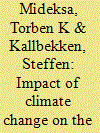|
|
|
Sort Order |
|
|
|
Items / Page
|
|
|
|
|
|
|
| Srl | Item |
| 1 |
ID:
111328


|
|
|
|
|
| Publication |
2012.
|
| Summary/Abstract |
EU's objective of attaining 20% reductions in greenhouse gas emissions by 2020 is analysed with a general equilibrium model detailing electricity generation technologies and capital vintaging. Consistent with theory and other analysts we find that the nonuniform treatment of emitting sectors in EU raises abatement costs - by a factor of two to three. Under cost effective emission reductions - a more comprehensive tradable cap-electricity generation abates more than its proportional share in emissions. The European economy abates by substitution towards natural gas, by energy efficiency improvements, and by reductions in emission intensive manufactures. Applied policies such as renewable support - and responses such as carbon leakage - hold down the prices for emission and electricity, thus also holds down incentives for energy efficiency and technological change. This leads to little preparation for the future and global mitigation.
|
|
|
|
|
|
|
|
|
|
|
|
|
|
|
|
| 2 |
ID:
096724


|
|
|
|
|
| Publication |
2010.
|
| Summary/Abstract |
Climate change will impact electricity markets through both electricity demand and supply. This paper reviews the research on this topic. Whereas there is much that remains unknown or uncertain, research over the last few years has significantly advanced our knowledge. In general, higher temperatures are expected to raise electricity demand for cooling, decrease demand for heating, and to reduce electricity production from thermal power plants. The effect of climate change on the supply of electricity from non-thermal sources shows great geographical variability due to differences in expected changes to temperature and precipitation. Whereas the research frontier has advanced significantly in the last few years, there still remains a significant need for more research in order to better understand the effects of climate change on the electricity market. Four significant gaps in the current research are regional studies of demand side impacts for Africa, Asia, the Caribbean and Latin America, the effects of extreme weather events on electricity generation, transmission and demand, changes to the adoption rate of air conditioning, and finally, our understanding of the sensitivity of thermal power supply to changes in air and water temperatures.
|
|
|
|
|
|
|
|
|
|
|
|
|
|
|
|
| 3 |
ID:
097517


|
|
|
|
|
| Publication |
2010.
|
| Summary/Abstract |
Climate change will impact electricity markets through both electricity demand and supply. This paper reviews the research on this topic. Whereas there is much that remains unknown or uncertain, research over the last few years has significantly advanced our knowledge. In general, higher temperatures are expected to raise electricity demand for cooling, decrease demand for heating, and to reduce electricity production from thermal power plants. The effect of climate change on the supply of electricity from non-thermal sources shows great geographical variability due to differences in expected changes to temperature and precipitation. Whereas the research frontier has advanced significantly in the last few years, there still remains a significant need for more research in order to better understand the effects of climate change on the electricity market. Four significant gaps in the current research are regional studies of demand side impacts for Africa, Asia, the Caribbean and Latin America, the effects of extreme weather events on electricity generation, transmission and demand, changes to the adoption rate of air conditioning, and finally, our understanding of the sensitivity of thermal power supply to changes in air and water temperatures.
|
|
|
|
|
|
|
|
|
|
|
|
|
|
|
|
|
|
|
|
|